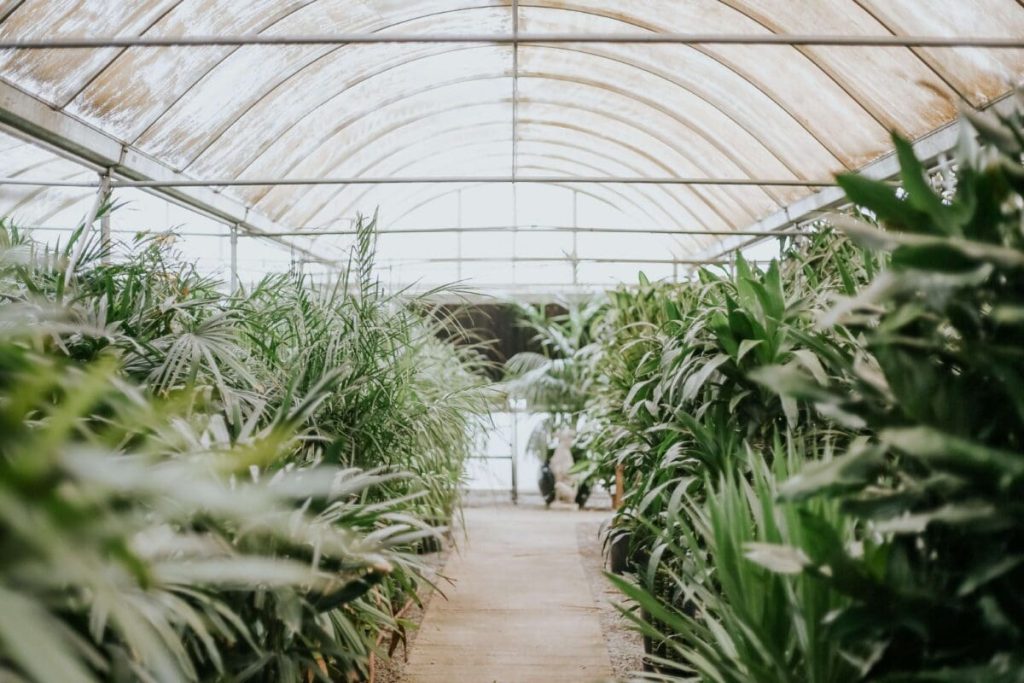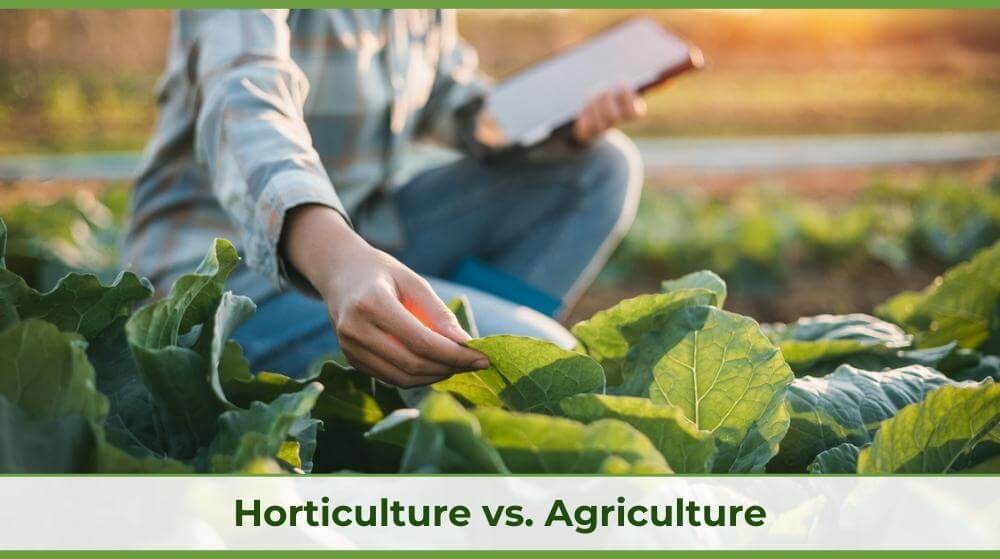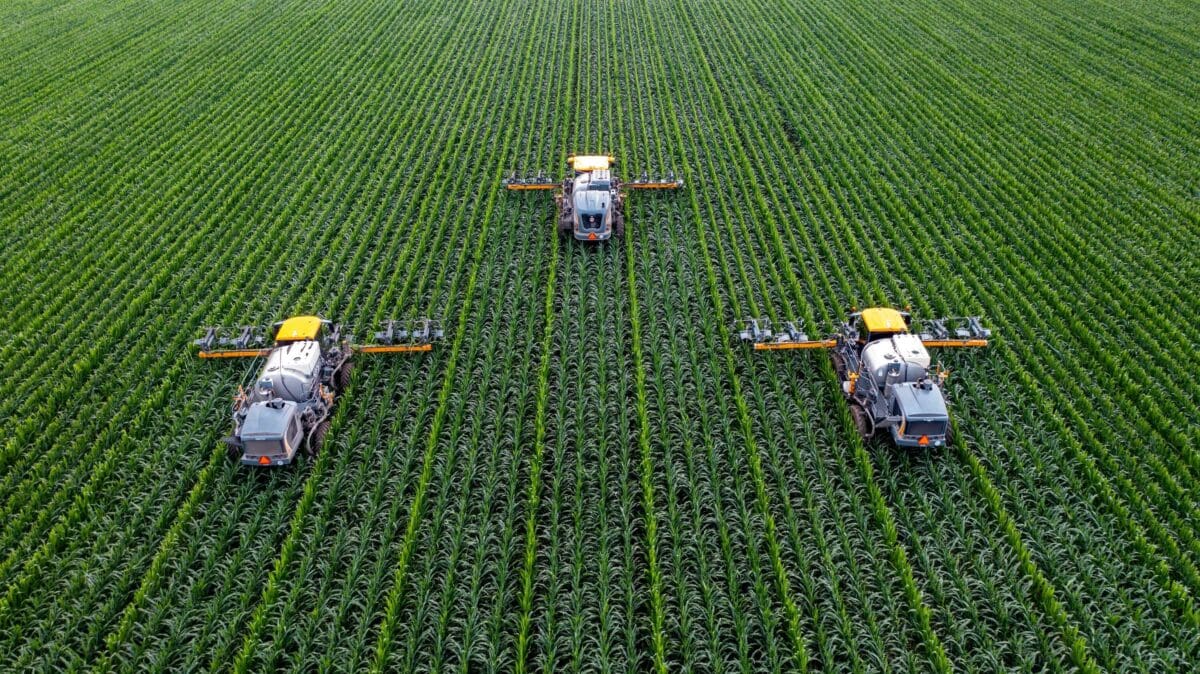
If you are looking for an impactful career in farming or plant cultivation, you may be wondering whether you should study horticulture vs agriculture. These distinct but sometimes overlapping farming methods both have pros and cons.
Studying horticulture or agriculture can give you the knowledge and tools to effect positive change and make food production more sustainable. Keep reading to learn how sustainable horticulture and agriculture are key to our society’s survival. This post also answers the question, what is the difference between agriculture and horticulture?

Interested in urban farming? Sustainable horticulture is the future of urbanism + environmentalism.
What is Horticulture?
Horticulture is the study of the cultivation of crops and plants for human consumption or aesthetic purposes such as gardening. Horticulture usually happens on a small scale like a greenhouse or formal flower bed. It deals with the cultivation of all types of flora, from trees and shrubs to flowers and vegetables. Horticulturists study plants and use technology to improve their quality and quantity.
Sub-disciplines of horticulture include:
- Olericulture – the production of vegetables
- Pomology – the production of fruit
- Floriculture – the production of flowering plants
- Landscape horticulture – involves designing, constructing, and maintaining landscapes
Benefits Of Horticulture
Horticulture uses scientific principles and technologies to improve the yields produced by plants. This means more food in your community garden or more products to sell at the farmer’s market. Horticulture often uses intercropping, or polycultures, which indigenous people have used for centuries to cultivate the land sustainably. For example, the Iroquois people always planted corn, beans, and squash together. The three crops provided mutual benefit to each other, increasing the yield and quality of the food crops and the lifespan of the soil.
Drawbacks Of Horticulture
Usually, horticulture requires a large up-front investment to buy equipment, soil, plants, and other supplies. It is usually very labor intensive, and working outside means exposure to environmental hazards. Gardens, greenhouses, and urban farms also attract rodents and other small animals that may become pests.
Other potential drawbacks of horticulture include high water consumption and water contamination if you use pesticides or other chemicals in your gardens. Lastly, horticulture sometimes leads to more invasive species in an area such as the poison hemlock which was brought into the country for aesthetic purposes.

What is Agriculture?
Agriculture involves the large-scale cultivation of plants and animals, usually for food. Agriculture includes traditional farming and raising livestock. Common crops and animal products produced in the U.S. include corn, soy, beef, and cotton.
Benefits Of Agriculture
Human civilization could not exist without agriculture. The main benefit of agriculture is that it supplies our society with an essential resource – food. It also provides many jobs, ingredients for medicines, and other raw materials such as wool and leather.
Hydroponics and aquaponics are often used in agriculture. These practices can also be used in horticulture, but their benefits are amplified when used in large-scale production. Hydroponics and aquaponics involve growing plants in water. Aquaponics also includes fish in the water to provide natural fertilizer to the plants. This sustainable practice could help improve plant and seafood production in the future.
Drawbacks Of Agriculture
The environmental impact of monoculture farming is seen in soil depletion, making the land unusable for cultivation. Non-sustainable farming practices have also led to increased global warming. For example, meat production produces 14% of the world’s human-made carbon emissions. The overuse of pesticides has harmed workers and animals and contaminated the water supply. However, these drawbacks can be mitigated by implementing more sustainable practices.
Find the best jobs in sustainable agriculture to turn your passion for food into a career.
Differences Between Horticulture And Agriculture
What is the difference between horticulture and agriculture? The main difference between horticulture and agriculture is the scale of production. Horticulture focuses on small-scale crop production, and agriculture focuses on large-scale production which means higher outputs. Agriculture tends to be monoculture, while horticulture tends to be polyculture.
Some people consider horticulture actually to be a subdivision of agriculture. Why is horticulture important to agriculture? Horticulture specializes in improving plant quality and yield which can be used to make agricultural practices more effective and sustainable. This includes making plants more nutritious and resistant to disease.
Agriculture VS Horticulture
|
Example Responsibilities: |
Scale: |
Output: |
Plants and/or Animals: |
|
|
Agriculture |
Livestock, orchard management, and irrigation |
Larger |
Higher |
Edible plants and animals |
|
Horticulture |
Greenhouse management and plant propagation |
Smaller |
Lower |
Edible and non-edible plants |
Importance Of Sustainable Horticulture
Horticulturists may work with urban planners to improve the symbiotic relationship between humans and the environment. There are easy ways to do this such as installing bioswales in homes, parks, and gardens. Bioswales are slanted beds of native plant species with deep filtering roots that create habitats for wildlife and collect rainwater. Designing technologies like bioswales and educating the public about sustainable gardening are some of the responsibilities of horticulturists.
With a degree in sustainable horticulture from Unity Environmental University, you will develop the skills to start your own urban farm, design hydroponics systems, or research how to improve fruit tree yields.
Importance Of Sustainable Agriculture
Adopting more sustainable agricultural practices is essential for continuing to feed the growing human population in our shifting global climate. Large-scale farms are beginning to incorporate more intercropping, eco-friendly pesticide control methods, and water conservation into their practices.
Business owners can also make an impact by shifting how they manage their farms. If you are interested in sustainable business management, consider a degree in sustainable food and farming from Unity Environmental University.
Join The Sustainable Horticulture Program At Unity Environmental University
To summarize, the difference between agriculture and horticulture is that agriculture is large-scale farming which includes raising animals, and horticulture is small-scale plant production which includes dealing with gardening. When choosing horticulture vs agriculture, think about what type of environment you want to work in and what kind of impact you want to have on the world.
Unity Environmental University offers a bachelor of science in sustainable horticulture completely online so that you can begin your new career as soon as possible. Looking for other jobs that allow you to be outside? Explore the top fields for nature lovers on Unity’s blog.



